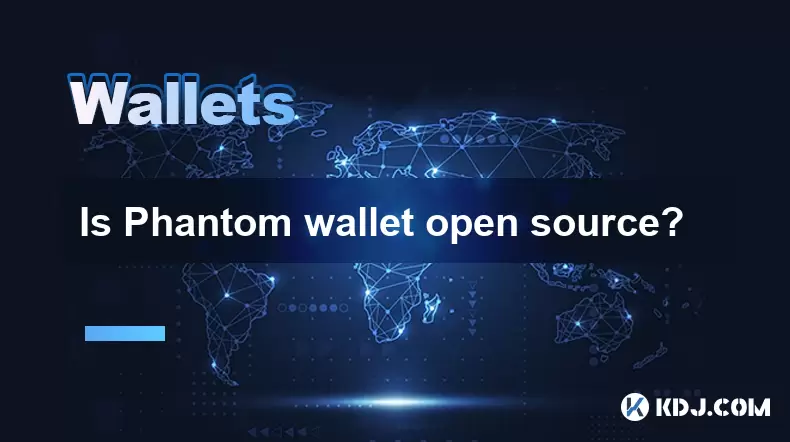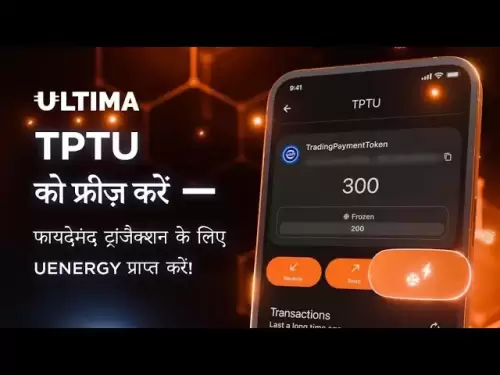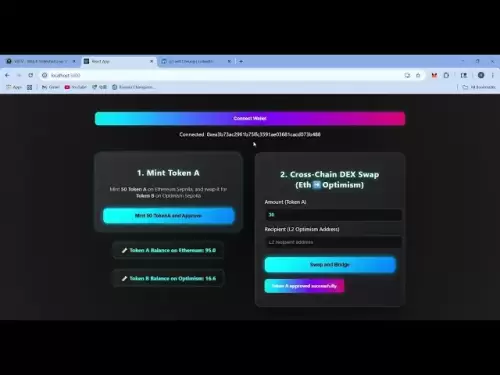-
 Bitcoin
Bitcoin $109,459.7682
2.44% -
 Ethereum
Ethereum $2,598.6052
6.29% -
 Tether USDt
Tether USDt $1.0003
0.00% -
 XRP
XRP $2.2734
3.95% -
 BNB
BNB $661.4886
1.58% -
 Solana
Solana $155.4825
4.35% -
 USDC
USDC $0.9999
-0.02% -
 TRON
TRON $0.2838
1.04% -
 Dogecoin
Dogecoin $0.1740
8.25% -
 Cardano
Cardano $0.6047
9.04% -
 Hyperliquid
Hyperliquid $40.2302
6.50% -
 Sui
Sui $2.9863
10.05% -
 Bitcoin Cash
Bitcoin Cash $509.5786
0.60% -
 Chainlink
Chainlink $13.8156
6.03% -
 UNUS SED LEO
UNUS SED LEO $9.0142
0.69% -
 Avalanche
Avalanche $19.0337
8.68% -
 Stellar
Stellar $0.2438
5.17% -
 Toncoin
Toncoin $2.9012
3.59% -
 Shiba Inu
Shiba Inu $0.0...01210
6.20% -
 Litecoin
Litecoin $90.0882
7.05% -
 Hedera
Hedera $0.1597
8.53% -
 Monero
Monero $326.3340
2.88% -
 Polkadot
Polkadot $3.6365
9.32% -
 Bitget Token
Bitget Token $4.6162
2.72% -
 Dai
Dai $1.0001
0.00% -
 Ethena USDe
Ethena USDe $1.0002
-0.01% -
 Uniswap
Uniswap $7.6403
10.47% -
 Pepe
Pepe $0.0...01060
12.03% -
 Aave
Aave $281.3664
7.56% -
 Pi
Pi $0.4992
1.76%
Why does the transfer fee of Exodus wallet suddenly increase?
Sudden increases in Exodus wallet transfer fees can be due to network congestion, crypto value fluctuations, and changes in fee estimation algorithms; users can minimize costs by monitoring network conditions and adjusting transaction settings.
Apr 08, 2025 at 06:35 pm

The sudden increase in transfer fees of the Exodus wallet can be a puzzling and frustrating experience for many users. To understand why this happens, it's essential to delve into the various factors that influence cryptocurrency transaction fees. Exodus wallet, like many other cryptocurrency wallets, relies on the underlying blockchain networks to process transactions. The fees associated with these transactions can fluctuate due to several reasons, including network congestion, changes in the cryptocurrency's value, and adjustments in the wallet's fee estimation algorithms.
Understanding Blockchain Network Congestion
One of the primary reasons for a sudden increase in transfer fees is network congestion. When a blockchain network experiences a high volume of transactions, the demand for block space increases. Miners, who are responsible for processing and validating transactions, prioritize transactions with higher fees. As a result, users may need to pay more to ensure their transactions are processed promptly. For instance, if the Bitcoin network is congested due to a surge in trading activity, the fees required to send Bitcoin from an Exodus wallet can spike significantly.
Impact of Cryptocurrency Value Fluctuations
Another factor that can lead to increased transfer fees is fluctuations in the value of the cryptocurrency. When the price of a cryptocurrency rises, the value of the transaction in fiat terms also increases. This can lead to higher fees, as the same percentage fee now represents a larger amount in fiat currency. For example, if the price of Ethereum doubles, the fee for sending Ethereum from an Exodus wallet might seem higher, even if the fee in ETH terms remains the same.
Changes in Wallet Fee Estimation Algorithms
Exodus wallet, like other wallets, uses fee estimation algorithms to suggest an appropriate fee for transactions. These algorithms take into account current network conditions and historical data to estimate the fee required for a transaction to be processed within a reasonable timeframe. Sometimes, these algorithms may adjust their estimates based on new data or changes in the network's behavior, leading to sudden increases in suggested fees. If Exodus updates its fee estimation model to be more conservative, users might see higher fees being suggested.
User-Initiated Fee Adjustments
Users themselves can also inadvertently cause an increase in transfer fees. Exodus wallet allows users to manually adjust the transaction fee. If a user selects a higher fee than necessary, either to expedite the transaction or due to a misunderstanding of the fee structure, this can result in higher costs. It's important for users to understand the fee settings in Exodus and adjust them carefully to avoid overpaying.
External Factors and Market Conditions
External factors and market conditions can also play a role in the sudden increase of transfer fees. For instance, regulatory news, major cryptocurrency exchange updates, or significant market events can lead to increased trading activity and network congestion. These events can cause a ripple effect, leading to higher fees across various blockchain networks, including those used by Exodus wallet.
How to Manage and Minimize Transfer Fees
While it's not always possible to avoid sudden increases in transfer fees, there are several strategies users can employ to manage and minimize these costs. Here are some practical steps:
Monitor Network Conditions: Before initiating a transaction, check the current state of the blockchain network. Websites like Blockchain.com or Etherscan can provide real-time data on network congestion and average transaction fees.
Adjust Transaction Speed: Exodus wallet allows users to choose between different transaction speeds, such as 'Economy', 'Normal', and 'Priority'. Opting for a lower speed can result in lower fees, though it may take longer for the transaction to be processed.
Batch Transactions: If you need to send multiple transactions, consider batching them into a single transaction. This can reduce the overall fee cost, as you'll only pay one fee instead of multiple.
Use Off-Peak Times: Try to send transactions during off-peak times when the network is less congested. This can help in securing lower fees.
Understand Fee Settings: Familiarize yourself with the fee settings in Exodus wallet. If you're comfortable with a longer processing time, you can manually set a lower fee.
Stay Informed: Keep an eye on cryptocurrency news and updates from Exodus wallet. Being aware of potential network changes or updates to the wallet's fee estimation algorithms can help you anticipate and prepare for fee increases.
Frequently Asked Questions
Q: Can I get a refund if I accidentally set a high fee in Exodus wallet?
A: Unfortunately, once a transaction is broadcast to the blockchain network, the fee cannot be refunded. It's important to double-check the fee settings before confirming a transaction.
Q: Does Exodus wallet charge any additional fees on top of the network fees?
A: Exodus wallet does not charge any additional fees for transactions. The fees you see are the network fees required by the blockchain to process your transaction.
Q: How often does Exodus wallet update its fee estimation algorithms?
A: Exodus wallet regularly updates its fee estimation algorithms to reflect changes in network conditions. However, the exact frequency of these updates is not publicly disclosed.
Q: Can I use a different wallet to avoid high fees on the same blockchain network?
A: While different wallets may have different fee estimation algorithms, the underlying network fees are the same across all wallets. Using a different wallet might not necessarily result in lower fees, as the fees are determined by the blockchain network itself.
Disclaimer:info@kdj.com
The information provided is not trading advice. kdj.com does not assume any responsibility for any investments made based on the information provided in this article. Cryptocurrencies are highly volatile and it is highly recommended that you invest with caution after thorough research!
If you believe that the content used on this website infringes your copyright, please contact us immediately (info@kdj.com) and we will delete it promptly.
- ZKasino's $30M Rug Pull: Founder Arrested in UAE – Justice Served?
- 2025-07-04 00:30:13
- Bitcoin's Bull Run: Standard Chartered and the ETF Inflow Effect
- 2025-07-04 00:30:13
- Bitcoin, Crypto, and Market Sentiment: Riding the Bullish Wave?
- 2025-07-04 01:10:12
- TON Unicorn Alert: Open Platform Hits $1B Valuation!
- 2025-07-04 01:10:12
- Online Marketplaces: Easier or Harder for Coin Collectors?
- 2025-07-04 01:30:13
- PEPE Eyes $0.000025 Rally: Liquidity Grab and Powerful Support Levels in Play
- 2025-07-04 01:30:13
Related knowledge

How to cancel a pending transaction in Phantom wallet?
Jul 03,2025 at 07:21pm
Understanding Pending Transactions in Phantom WalletA pending transaction in the Phantom wallet occurs when a user initiates a transfer or interaction with the Solana blockchain, but it hasn't yet been confirmed by the network. This can happen due to various reasons such as low transaction fees, network congestion, or incorrect gas settings. It's import...

How to see the estimated value of my tokens in Phantom wallet?
Jul 04,2025 at 12:21am
What is Phantom Wallet?Phantom wallet is one of the most popular cryptocurrency wallets designed for the Solana blockchain. It allows users to store, send, receive, and manage various tokens built on Solana, including SPL tokens and NFTs. The wallet offers a user-friendly interface, making it accessible for both beginners and advanced users in the crypt...

How to lock my Phantom wallet extension?
Jul 03,2025 at 11:14am
What Is the Phantom Wallet and Why Lock It?The Phantom wallet is a popular non-custodial cryptocurrency wallet designed for interacting with the Solana blockchain. Supporting both browser extensions and mobile apps, Phantom allows users to store, send, receive, and stake SOL tokens, as well as interact with decentralized applications (dApps). Securing y...

Does Phantom wallet offer two-factor authentication (2FA)?
Jul 03,2025 at 09:00am
Understanding Phantom Wallet and Its Security FeaturesPhantom wallet is a widely used non-custodial cryptocurrency wallet that supports the Solana blockchain. It allows users to store, send, receive, and interact with decentralized applications (dApps) seamlessly. As security is a top priority for any crypto wallet user, security features like two-facto...

What is "rent" on Solana and how does it affect my Phantom wallet?
Jul 02,2025 at 08:35pm
Understanding 'Rent' on SolanaIn the context of Solana, the term 'rent' refers to a storage fee that users pay for maintaining data on the blockchain. Unlike Ethereum, where storage costs are paid once via gas fees during contract deployment, Solana implements a recurring cost model to ensure efficient usage of network resources. This means that any acc...

Is Phantom wallet open source?
Jul 03,2025 at 12:29am
What is Phantom Wallet?Phantom wallet is a non-custodial cryptocurrency wallet primarily designed for the Solana blockchain. It allows users to store, send, receive, and interact with decentralized applications (dApps) on the Solana network. The wallet is available as a browser extension and mobile application, offering a seamless experience for both be...

How to cancel a pending transaction in Phantom wallet?
Jul 03,2025 at 07:21pm
Understanding Pending Transactions in Phantom WalletA pending transaction in the Phantom wallet occurs when a user initiates a transfer or interaction with the Solana blockchain, but it hasn't yet been confirmed by the network. This can happen due to various reasons such as low transaction fees, network congestion, or incorrect gas settings. It's import...

How to see the estimated value of my tokens in Phantom wallet?
Jul 04,2025 at 12:21am
What is Phantom Wallet?Phantom wallet is one of the most popular cryptocurrency wallets designed for the Solana blockchain. It allows users to store, send, receive, and manage various tokens built on Solana, including SPL tokens and NFTs. The wallet offers a user-friendly interface, making it accessible for both beginners and advanced users in the crypt...

How to lock my Phantom wallet extension?
Jul 03,2025 at 11:14am
What Is the Phantom Wallet and Why Lock It?The Phantom wallet is a popular non-custodial cryptocurrency wallet designed for interacting with the Solana blockchain. Supporting both browser extensions and mobile apps, Phantom allows users to store, send, receive, and stake SOL tokens, as well as interact with decentralized applications (dApps). Securing y...

Does Phantom wallet offer two-factor authentication (2FA)?
Jul 03,2025 at 09:00am
Understanding Phantom Wallet and Its Security FeaturesPhantom wallet is a widely used non-custodial cryptocurrency wallet that supports the Solana blockchain. It allows users to store, send, receive, and interact with decentralized applications (dApps) seamlessly. As security is a top priority for any crypto wallet user, security features like two-facto...

What is "rent" on Solana and how does it affect my Phantom wallet?
Jul 02,2025 at 08:35pm
Understanding 'Rent' on SolanaIn the context of Solana, the term 'rent' refers to a storage fee that users pay for maintaining data on the blockchain. Unlike Ethereum, where storage costs are paid once via gas fees during contract deployment, Solana implements a recurring cost model to ensure efficient usage of network resources. This means that any acc...

Is Phantom wallet open source?
Jul 03,2025 at 12:29am
What is Phantom Wallet?Phantom wallet is a non-custodial cryptocurrency wallet primarily designed for the Solana blockchain. It allows users to store, send, receive, and interact with decentralized applications (dApps) on the Solana network. The wallet is available as a browser extension and mobile application, offering a seamless experience for both be...
See all articles

























































































